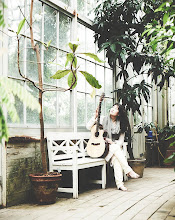Resonance :: bridging the past and the present

When you strike one string of a citar, the vibrations will set the other strings vibrating too...
This fact can be seen in life too - certain events, certain people or places can 'strike a tune', thus creating a resonance within...

This month I participated in a 10-day workshop of Korean traditional music and folklore singing and dancing, which was given by very talented classically examinated musicians from Jeong Ga Ak Hoe, Seoul, Korea. The workshop was held in Copenhagen and organized by the Korean Language and Culture School for Adoptees.
The essence of resonance is that it can create a bridge not only between one string and other strings, but also between one person and other people - and between past and present.
Somehow, I experienced a 'feeling' of resonance - it was ignited by outside events, but started connecting with something, a feeling, a mindset, an atmosphere which surfaced from within.
As an ardent lover of arts and beauty - and a free-time singer and musician, I already cancelled any other appointments to be able to concentrate on this music workshop with Jeong Ga Ak Hoe. Besides the music - the workshop was lots of fun, nice atmosphere, tasty Korean food and meeting new and known friends.
The schedule was ambitious - and during these days, Korean sounds, rythms, guteral vocals, lots and lots of Korean words - some of which were in Hancha - were absorbed and ignited a learning proces. In some ways, the music resonated within me without having any "intentions, oppinions or memories"- but each day, layers from past and present were made conscious.
Like fire sparks jumping through air, like waves of sound moving through space - rythms (hui mo ri) and sound vibrations from the hour-glass shaped drum, 'janggu', the pure feeling of the bamboo flute, 'danso' and the almost eerie strength of vocals combined with the ancient beauty of the Korean culture of folklore song tradition - started resonating within my mind, body and spirit.
Korean traditional music is a rare combination of a refined arts expression and a deep understanding of Nature's sounds and rythms, which is portrayed in the various instruments. Some instruments are compared to the sound and rythm of rain, some to the sound and rythm of wind etc. I've had a glimpse - and believe that a lot of wisdom about life, mind and soul can be discovered by going deeper into this tradition and by practising.
No matter whether I'll ever learn to play the janggu or sing the kangkangsule perfectly or even remotely well enough for others to listen to and honestly enjoy it - or not .... my personal experience of these sounds and rythms moving within every cell, resonating within - has given new insight.




